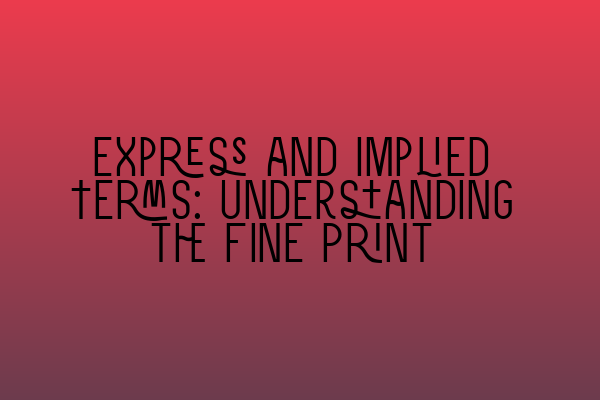Express and Implied Terms: Understanding the Fine Print
When entering into a contract, it is essential to understand the terms and conditions that govern the agreement. These terms can be explicitly expressed by the parties or implied by law. Understanding the difference between express and implied terms is crucial to ensure that your rights and obligations are protected. In this article, we will explore the concept of express and implied terms in contract law and highlight their significance in contractual relationships.
Express Terms
Express terms are those explicitly agreed upon by the parties involved in the contract. These terms can be in written or verbal form, but it is always recommended to have written documentation for clarity and evidence purposes. Express terms outline the specific rights and duties of each party and provide clarity on the agreement’s key aspects. They can include details about the price, payment terms, delivery timeline, and any other specific conditions relevant to the contract.
It is essential to review the express terms meticulously before signing the contract to ensure that they accurately reflect the agreement between the parties. If any potential issues or ambiguities arise, it is crucial to seek legal advice to clarify the intent and scope of the express terms.
To better understand express terms, it is helpful to consider an example. Let’s say you are purchasing a vehicle from a car dealer. The express terms may include the make and model of the car, the price, any additional features or accessories included, the payment method, and the delivery date.
If a dispute arises concerning the vehicle’s features, the express terms will be the guiding factor in determining the parties’ rights and obligations.
Implied Terms
Unlike express terms, implied terms are not explicitly stated but are nonetheless legally binding. These terms are inferred by law or common practice and are assumed to be part of a contract, even if they are not expressly mentioned.
Implied terms can arise in various forms, such as through statutes, past dealings between the parties, or the custom and usage of a particular trade or profession. Courts may imply terms to give effect to the parties’ intentions or to fill in any gaps that might exist in the contract.
For example, in a sale of goods contract, the Sale of Goods Act 1979 in the UK implies terms that the goods must be of satisfactory quality and fit for their intended purpose. Even if these terms are not explicitly mentioned in the contract, they are considered to be automatically included.
Implied terms can also arise from the conduct of the parties. If, for instance, there is a consistent practice between the parties in previous transactions, the court may infer that this practice should be incorporated into the current contract.
The Importance of Understanding Express and Implied Terms
Understanding the fine print of a contract, including both express and implied terms, is crucial to ensure that both parties are aware of their rights and obligations. Failure to understand these terms can lead to misunderstandings, disputes, or even potential breaches of contract.
By comprehending the express terms, you can set clear expectations and avoid any potential surprises during the contractual relationship. Reviewing the express terms carefully before signing the contract allows you to negotiate any necessary changes and ensure that the agreement aligns with your intentions.
Similarly, understanding the implied terms is essential to avoid any unintended consequences. These terms can impact your rights and the overall outcome of the contract. Therefore, it is essential to be aware of the relevant legal provisions or customs associated with the contract’s subject matter.
Conclusion
In summary, when entering into a contract, it is crucial to understand the express and implied terms that govern the agreement. Express terms are explicitly agreed upon by the parties and outline the specific rights and obligations. On the other hand, implied terms are inferred by law or common practice and are automatically included in the contract. Understanding both types of terms is essential to ensure that your rights and obligations are protected and to avoid any potential misunderstandings or conflicts.
To dive deeper into the world of contract law and prepare for your legal exams, consider exploring the following related articles:
